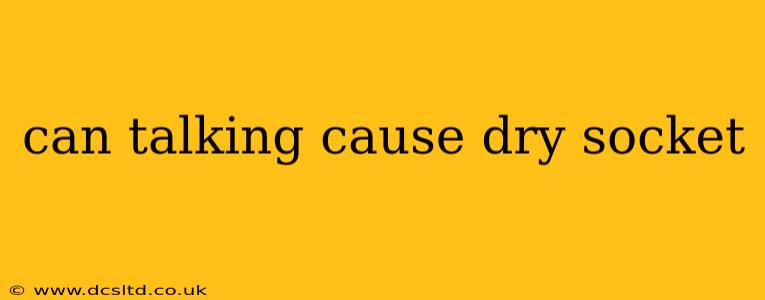Dry socket, also known as alveolar osteitis, is a painful complication that can occur after a tooth extraction. While it's not directly caused by talking, certain activities after an extraction, including talking excessively, can increase your risk. Let's delve into the connection between talking and dry socket, exploring the factors involved and how to minimize your risk.
What is Dry Socket?
Dry socket occurs when the blood clot that normally forms in the extraction site becomes dislodged or dissolves prematurely. This exposes the underlying bone and nerve endings, leading to intense pain, bad breath, and sometimes a foul-tasting discharge. The pain is often described as throbbing and persistent, and it may radiate to other areas of the face.
Can Talking Excessively Increase the Risk of Dry Socket?
Talking, especially excessive talking, can increase the risk of dry socket because it creates suction and pressure changes in the mouth. This suction can dislodge the crucial blood clot that's forming in the extraction socket. The more you talk, and the more forcefully you talk, the greater the risk. This isn't to say that a few words will cause a problem, but prolonged or forceful conversation immediately after the extraction should be avoided.
Other Factors That Contribute to Dry Socket
While talking contributes to the risk, it's not the sole cause. Several other factors can increase the likelihood of developing dry socket:
- Smoking: Smoking significantly increases the risk of dry socket because it disrupts blood flow to the extraction site and prevents proper clot formation. The suction created by smoking is particularly detrimental.
- Poor Oral Hygiene: Inadequate oral hygiene can introduce bacteria into the extraction site, hindering the clotting process and increasing the risk of infection, which can lead to dry socket.
- Infection: A pre-existing infection in the mouth can also increase the risk.
- Difficult Extraction: Complex extractions that involve significant bone removal or trauma to the socket are more likely to result in dry socket.
- Birth Control Pills: Some studies suggest a possible correlation between using birth control pills and an increased risk of dry socket, although more research is needed.
- History of Dry Socket: If you’ve experienced dry socket before, you’re at a higher risk of experiencing it again.
How to Minimize Your Risk of Dry Socket After a Tooth Extraction
Following your dentist or oral surgeon's post-operative instructions is crucial in preventing dry socket. This typically includes:
- Avoiding smoking: This is perhaps the most important step you can take.
- Gentle rinsing: Rinse your mouth gently with saltwater as directed by your dentist. Avoid forceful rinsing or spitting.
- Avoiding straws: The suction created by straws can dislodge the blood clot.
- Eating soft foods: Avoid hard, crunchy, or chewy foods that could dislodge the clot.
- Limiting strenuous activity: This helps to prevent increased blood pressure and potentially dislodging the clot.
- Minimizing excessive talking: As mentioned, limit strenuous talking, especially in the immediate aftermath of the procedure.
What to Do If You Suspect You Have Dry Socket
If you experience severe pain, bad breath, or a foul-tasting discharge from the extraction site, contact your dentist or oral surgeon immediately. Early treatment is essential to manage the pain and prevent further complications.
Conclusion
While talking itself doesn't directly cause dry socket, excessive talking, particularly forceful or prolonged conversation immediately after an extraction, can contribute to its development. By adhering to your dentist's post-operative instructions and minimizing activities that could dislodge the blood clot, you can significantly reduce your risk of experiencing this painful complication. Remember, prevention is key. Consult your dentist or oral surgeon if you have any concerns or questions.
